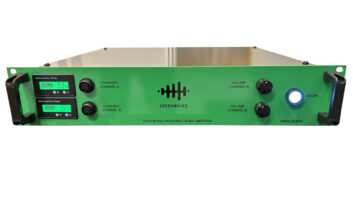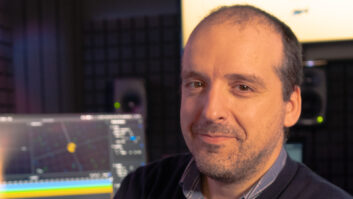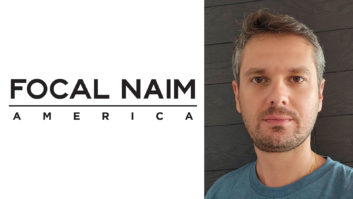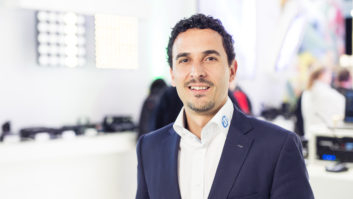Yorkshire, UK (January 28, 2020)—“The live music scene is getting increasingly competitive and the needs of our industry have changed,” said BishopSound founder Andrew Bishop when his company debuted its line array system. “Promoters are driving rental companies into the ground by offering less money for the sound at events, and the middle market for high-quality, affordable P.A. products has been vacant—that is, until now.”
Designed and tuned in the UK and manufactured in China, the company’s Delta Dual Passive line array system aims to provide a more affordable solution for the live sound market without compromising on audio quality. The line array consists of four Dual 8-inch boxes that come in a purpose-built plywood flight case. The speakers are BishopSound’s own Neo Drivers with 2.4-inch voice coils and twin 1.23-inch HF units with titanium diaphragms; British-made Kevlar speaker cones are incorporated, while each box handles 600W RMS. The company is also launching subwoofers designed to work with the line array to offer a “complete package.”
Tell us about the origins of BishopSound.
I started BishopSound in 2016, drawing on my previous experience in several different industries, culminating with me owning the amplification and P.A. manufacturer Carlsbro. Carlsbro had been taken over by a Chinese company and I was working as a consultant for a number of famous brands before being more or less dragged back into the audio world by former export customers who were complaining that they didn’t like the sound of some of the “affordable” P.A. products they were being offered. The fact that they were willing to place quite large orders with me if I would come up with a genuinely different range made the idea very appealing, so I gathered a team of engineers and designers, and we set about coming up with a very distinctive approach to the market, both in terms of our products and the way we sold them.
I could see that there was an opportunity to offer speakers that sounded different—what I call the “British sound,” a more musical sound—and that are either sold directly online by me or by a handful of genuine specialists at very affordable prices, and in both cases, with an emphasis on personal service.
When we began, we were offering point-source speakers and a huge range of accessories to end users—bands, entertainers, DJs, colleges, venues and the like—but word got around that our products were affordable, reliable and sounded great, so we were soon selling to installers and hire companies, who are always under significant cost pressures.
Is the product line manufactured entirely in the UK?
We are adding new British-made products to the portfolio, but focusing on large subwoofers and wedge monitors at this time. These are being designed and manufactured in the UK. Presently, our Delta Dual passive line array is designed and voiced here, and manufactured in China.
What made you decide to launch a new product range into an already highly competitive market?
This is a carefully researched move borne out of comments we have had from professional customers who are finding they can no longer make a profit hiring out some of the big-brand products. Hire companies are under extreme pressure from promoters, festival organizers and so on to cut their prices. For a major tour or a festival main stage, [brand names are] worthy of consideration, but on B stages or at smaller venues, they need something good sounding, reliable and affordable; the fact that there isn’t a big-brand name on the boxes just doesn’t matter. What matters is that it works, sounds great, and they can make a profit from using it.
Where will the range be available?
It’s available in stock immediately. Our business model is very different from most others. We manufacture and sell direct to the end user online via our website. However, we are growing local support by adding agents and dealers who are keen to work with us. Our new Listening Center in the Midlands is just that: a place to have a private consultation with professional sound engineers who are not on the payroll but simply enjoy our sound and believe it to be exceptional value for money. This is not a shop. It’s more like a doctor’s consulting room where you can get “one to one” advice and even on-site support if required.
You say the business is able to offer a more cost-effective alternative to some of the “big name” line array brands. How have you been able to do this?
Because we are a very lean company. BishopSound consists of just my wife Victoria and myself. Of course, we don’t try to do everything, so we have a team of professional designers, sound engineers and advisors who work on projects for us. We don’t have a huge infrastructure to support, with inflated overheads. Neither do we use expensive routes to market. We pay attention to the product and not all the “riders,” like the size of the show stand, posh offices, armies of representatives, entertaining, wining and dining. If you meet us, we will put the kettle on for a mug of Yorkshire tea and listen to your needs.
What are your ambitions for 2020 and beyond?
We will continue to talk and listen directly to our customers, and if we get enough people asking for the same thing, we will agree on a price point and make it. We have been very customer-led from the outset. We will stick to the common thread: “Make products that are reliable, affordable and durable.”
What are the biggest opportunities for you in the market?
Export is obviously going to be increasingly important. We already do export, but there is enormous potential, especially as we are starting to offer increasing numbers of products that are not only British-designed and -voiced, but made here, too. That counts for a lot, and it matters a lot to me personally.
We’re very much a Yorkshire-based company, and Yorkshire was once the home of the British audio and speaker business. We’d like to play a part in bringing manufacturing back home.
And the biggest challenges?
Managing such tremendous growth is a challenge in itself. Naturally, there are technical challenges and production challenges, too, but mostly our biggest challenges are business-related, which will be only too familiar to all. Fortunately, we have been able to get some very experienced people to help us with those, which is one of the advantages of the model we use of calling in outside experts on an as-needed basis.
On a personal note, continuing to make time to talk to customers so I can learn even more about their needs is always hard. It comes as a surprise to a lot of our customers that when they call us, they speak to the person whose name is on the box. That is a real source of satisfaction to me—that our customers feel they have a relationship with us and that we are there for them. This isn’t an idle marketing claim; it is quite literally how we work. The downside of that is it takes a lot of time. I am constantly looking for ways to create that time.
BishopSound • www.bishopsound.com
This article originally appeared in Pro Sound News sister magazine Pro Sound News Europe with the headline “‘Bishop sound’: BishopSound founder Andrew Bishop talks his new company.”







